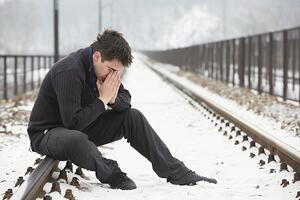
About six months after forming that theory, I once again fell into patterns of sleep that could be deemed “normal” – I went to bed around 9:00 or 9:30 at night and got up at 6:00 every morning.
This led me to believe that perhaps my lifelong problems with insomnia (or, more accurately, hyposomnia) could just be the result of excessive stress and clinical depression.
The return to the “normal” schedule came on the heels of meeting a new significant person in my life, whom I later married. For nearly a year, sleeping at normal times worked just fine for me – in the past, bouts of normal night time sleeping only lasted for a couple of weeks, at most a couple of months.
This lengthy stretch stirred hopes that it might be real, that maybe I could live as a normal diurnal member of society. That ended roughly 18 months ago, and I am once again faced with the reality that I can no longer ignore – I am, and probably always will be, a night creature.
My husband now fondly announces to family and friends that he has married a vampire. During the nights I am wide awake and exceptionally productive with work. Once the sun rises, my body shuts down.
Every morning and afternoon is a struggle toward productivity, but the moment darkness falls the drowsiness falls away and it’s time to live. The only true sound sleep comes with the midday sun.
About Delayed Sleep Phase Syndrome
Sleeping pills don’t work, warm milk and a relaxing soak in the bubble bath doesn’t work, and nothing short of a solid knock on the head is likely to work at the time the rest of the family is going to bed.
Sound familiar? Imagine my surprise when I realized that prestigious organizations and institutions know this exact set of symptoms – places like the Cleveland Clinic, the Mayo Clinic, and the American Sleep Association. They call it delayed sleep phase syndrome, also commonly called delayed sleep phase disorder.

Delayed sleep phase syndrome is described as primarily a problem of adolescents and young adults. This particular group has a far higher percentage of people who stay up until the early morning hours and sleep through until the early afternoon hours.
Such verbiage – and, I suspect, such data – suggests a very strong lifestyle correlation with delayed sleep phase syndrome. This can, perhaps, obscure what is likely a relatively very small percentage of people whose sleep cycles cannot be explained away by lifestyle.
Delayed Sleep Phase Syndrome Treatments
Several treatments are suggested for delayed sleep phase syndrome, including a process of pushing the sleep schedule forward a couple of hours every couple of days, ceasing to push forward once the desired hours are reached.
Another suggests simply picking a schedule and sticking to it, come hell or high water. These don’t work? Many experts would suggest you’re not trying hard enough, or that you’re not committed enough to your normal schedule.
Further treatment options may include light therapy to try to “re-set” your internal clock to its “normal” diurnal schedule, possibly in conjunction with melatonin supplements to help re-adjust your circadian rhythm.
Delayed Sleep Phase Syndrome or Nocturnality?
They say that abnormal sleep phases for three months or more constitutes a disorder or syndrome. This can mean sleeping and waking too early, too late, around swing shifts, or while adjusting to new time zones.
These are all forms of circadian rhythm disorder. Three months…what, then, does a lifetime of abnormal sleep cycles constitute?
What happens when, regardless of time zone or light therapies, the sun always triggers sleep and the light of the moon and stars triggers increased activity? Most of the world still calls it a disorder – but then, how many labels have been given to traits that are normal in humans, but not “mainstream normality?”
This is where my line of thinking always hits a dead-end. The scientific community and most of the world has tentatively begun to look at the possibility, but few aside from those who have struggled with being nocturnal (or are possibly just realizing that they don’t actually have a disorder) seem to think that it can happen.
This is not a matter of the body not knowing when the sun is out and when it’s not (a problem often associated with people who work indoors away from windows for extended periods of time), it’s the body responding to the sun the same way that experts say it should be responding to dark.
Let’s put this in perspective a little bit. I live in Wyoming, in the mountains of the US. During the summer, days stretch until 9:30 at night and the sun rises again around 6:00 in the morning.
Throughout the winter, the sun may not rise until 8:30 or 9:00 in the morning and it will be gone again by 4:30 in the afternoon. By the natural order of circadian rhythm disorders, especially assuming someone is undergoing light therapy throughout these seasonal changes, the sleep and alert cycles should not change significantly if the lifestyle remains the same – yet in the summer I am alert and productive around 10:00 p.m., whereas winter sees that same alert productivity around 5:00 p.m., and that aside from Seasonal Affective Disorder complicating things.
At The Alaska Sleep Clinic we understand that the dark, winter nights can be difficult for many, and even cause severe symptoms of depression in others. Because depression is often linked to sleep disorders, we want to help you get the best treatment for your disorders possible. If you think you, or a loved one, may have seasonal affective disorder, feel free to contact us for any of your sleep related needs, and get started on your way to a happier, healthier life.
About author: Mary Jones is a book lover and wonderful writer in Buy Essay Online company. She lives in California. Mary studied creative writing courses. Her favorite hobby is drawing with her children.
Topics: insomnia, seasonal affective disorder, delayed sleep phase
Subscribe to our Blog









